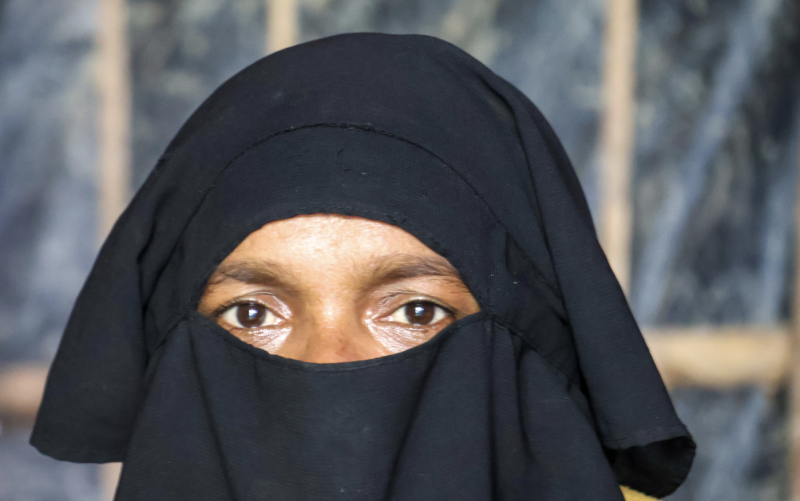A Rohingya mother’s ordeal of rape, loss and survival
September 1, 2025
In recent times, we have heard many stories of hardship and displacement among the Rohingya people of Arakan State.
The humanitarian agencies and international organisations like Fortify Rights and UN have been working consistently to document the genocide in Myanmar. As the days pass, the situation only gets worse. Since 2014 a multitude of reports have been published identifying and condemning the displacement of the Rohingya and the atrocities being carried out against them. The plight of the Rohingya is ongoing and the world has very little to say about it. Every day, a multitude of Rohingya refugees take the perilous journey to the border and cross the river to Bangladesh, where they are hoping to find safety. What they find is not what they expect. The campsite is desperately overcrowded and everyone struggles to survive. But still the refugees keep coming, they have no other option.
One of those refugees is named Asiya. She is a mother of four who comes from a village called Da Pyu Chaung in Arakan State. Life has never been easy for Asiya; she and her husband earned a basic income selling vegetables to survive. Asiya’s life was focused on helping her husband and caring for her children, and like all mothers she hoped for a better future for her children. Asiya’s husband, Hassan Ahmed, was a hard-working man and together they managed to support their children, and some of the extended family, but it was never easy. Living in Myanmar was unsettling as there was always conflict. Nonetheless, like most families, Asiya and her husband had dreams. Asiya desperately wanted to see her children educated. She didn’t want them to live in poverty, but those dreams were shattered when the Arakan Army, an ethnic Rakhine armed group, began targeting villages, assaulting and killing the Rohingya people.
The Arakan Army is in conflict with Myanmar’s military and both have been attacking, looting and burning Rohingya villages. Many Rohingya have been killed, women have been raped, homes looted and burned to the ground, often with the occupants inside. The brutality carried out by the Arakan Army has been aimed at driving the Rohingya out of the state and they have succeeded; a mass exodus of Rohingya has been taking place. There are numerous attacks on the Rohingya aimed at removing them from Arakan State. The Rohingya are considered outsiders, despite having lived in the region for hundreds of years, they are called “Bengli”, a deeply offensive name that effectively marks them as interlopers and renegades,
On 20 March 2024, Arakan Army soldiers entered Asiya’s village, killing her husband and sister, Fatema and brutally beating her father, Syed Hossain. The neighbours watched, but were unable to retaliate. The soldiers set the family home alight, burning all their worldly possessions, including important documents. The entire community was set alight, and the landscape was strewn with dead and injured bodies.
This was not the end of the atrocities. Six months later, the soldiers returned, and another attack took place. Asiya’s father was badly beaten and Asiya was captured, tortured, and raped. She feared for her life, but as it happened the attack was interrupted when fighting broke out between the Arakan Army and the military, and this gave the family an opportunity to escape. They ran to save their lives.
Fleeing the village meant a long and arduous journey and no-one knew if they would make it to the border alive. They were helped by villagers who guided them to the Naf River, a waterway that divides Myanmar from Bangladesh. It took five days to reach the river and some relatives paid for a boat to take them across to the other side. Finally, they reached Bangladesh. Asiya, her four children, and her injured father did not think they would survive
First, they had to travel to a Rohingya village named Sin Dawng where they spent one day until they had to start walking again. They walked from Sin Dawng to another Rohingya village, named Sindi Prang, where they stayed for two days. Then they started walking in order to reach a hill in Maung Daw in the Alay Than Kyaw area. They stayed for a day at the hill and started walking again to the border. There were relatives there also planning to take the same journey to Bangladesh. The relatives paid the cost of the boat. They had no sustaining food, only some homemade snacks to ease the hunger.
When Asiya and her family arrived in the Bangladesh camp in March 2025, they were exhausted and hungry, but they were faced with another problem. Due to funding cuts, there was a shortage of everything in the camp; food, clothing, and the basic utensils needed to survive. The journey was traumatic, but they thought once they were in Bangladesh they would be safe and cared for. However, the reality was marked by hardship, neglect, poor care and uncertainty.
Asiya’s testimony highlights the brutal atrocities committed against Rohingya civilians, including rape, killings, forced displacement, and the systematic destruction of homes and property that remain unaddressed and demand recognition, justice, attention and protection for her community.
The views expressed in this article may or may not reflect those of Pearls and Irritations.

